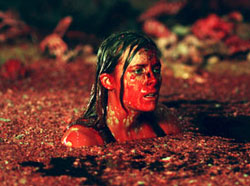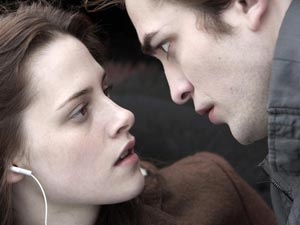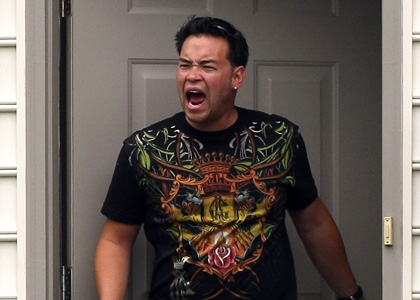 Although the recent Diablo Cody-penned post-feminist horror flick “Jennifer’s Body” didn’t scare up much box office, it has resurrected an interest in both womens’ surprising consumption of horror films, and the robust body of work surrounding feminism and the genre, in particular the trope of the “Final Girl,” that strong-willed, determined gal who survives all of her male and less-pure female friends, flips the game on the psycho, and either escapes the killer (until they meet again in a sequel) or dispatches him herself. (Read more about The Final Girl, in Carol J. Glover’s Men, Women and Chainsaws: Gender in the Modern Horror Film.)
Although the recent Diablo Cody-penned post-feminist horror flick “Jennifer’s Body” didn’t scare up much box office, it has resurrected an interest in both womens’ surprising consumption of horror films, and the robust body of work surrounding feminism and the genre, in particular the trope of the “Final Girl,” that strong-willed, determined gal who survives all of her male and less-pure female friends, flips the game on the psycho, and either escapes the killer (until they meet again in a sequel) or dispatches him herself. (Read more about The Final Girl, in Carol J. Glover’s Men, Women and Chainsaws: Gender in the Modern Horror Film.)
The Slumber Party Massacre (1982)
Written by noted feminist activist and author Rita Mae Brown and directed by Amy Holden Jones, this slasher flick touted its female-friendly pedigree on the back of the box– a siren call for any Junior High group of gals looking for some Friday night fun. Rumor has it that ‘Massacre’ was originally conceived as a parody of the genre–the killer uses a massive drill to dispatch his victims (yes, it’s that phallicly obvious), but producers churned out an earnest rendition with some unintentionally, classically funny bits. Valerie, the new girl in town, isn’t invited to neighbor Trish’s slumber party, but that doesn’t stop her from getting involved when the local escaped insane murderer crashes.
The Descent (2005)
A group of spunky, spelunking girlfriends head out on a caving expedition only to discover that the cave holds as many secrets as the group. Defying usual horror film convention, the cast is entirely made up of women, meaning that one of the bad guys isn’t, well, a guy. Written and directed by Neil Marshall (who gave the world the horror-ific “Dog Soldiers”), this tale of subterranean sisterhood versus hungry humanoids got a special ending for the North American market, as the original ending, which asks “do you really want to be the Final Girl?,” was deemed too dark. Luckily, both endings are included on the DVD.
The sequel to the female-driven “Alien,” serves up not one Final Girl, but two. Sigourney Weaver’s “Ellen Ripley” is awakened from cryostasis only to find that the planet where she and the crew of the Nostromo battled the aliens in the first film has been colonized, but radio contact has been lost. Although horribly treated by “The Company,” Ripley, guiding a crew of space Marines, heads back to LV-426 only to discover that the monster has been very busy during her 50 year nap and that there’s a little girl, “Newt,” who needs rescuing. The claustrophobic final mom-o a mom-o confrontation pits the human Final Girl versus the alien Final Girl, who is simply defending her and her offspring’s existence. Yet, sympathies clearly lay with Ripley. In the end, this action packed Sci-Fi Thriller proves that a woman can be a warrior (kicking alien ass) and still retain her maternal instincts.
Carrie (1976)
It’s hard to know where to start with “Carrie.” This tale of a mousy telekinetic teen routinely abused by both her classmates and her hyper-religious mother, is one of Stephen King’s scariest and most symbolic works. The rise of the newly pubescent Carrie’s deadly supernatural power mirrors the arrival of the power and confusion of her blossoming womanhood, at times inconsistent and frightening to both her and those around her. And while she breaks boundaries, throwing off the religious conventions of what her mother thinks a good girl should be, it is her searing, unadulterated appetite for vengeance after the famous prom pig-blood drenching incident that shatters female archetypes. Women are supposed to prefer subtle revenge, not the masculine mayhem of the final scenes. But that’s what makes Carrie so interesting: she’s both the victim and the monster.
Share your own fave femme frighteners!


